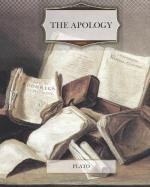|
|
The Apology Objects/Places
Marketplace: This is where the people of the towns used to meet and do their shopping. It is significant because it is where Socrates used to address people and converse, and criticize them. It is in the language used in the marketplaces that Socrates addresses the court, as opposed to courthouse language.
Critics: These are the people that accused Socrates and took him to court. They fall into two categories: those who directly accused him, and those who influenced others to have a negative opinion of him.
Prytaneum: Free dining at the Prytaneum is provided for Olympic winners, and members of certain eminent families. It is a place of honor. Socrates is suggesting that he deserves to be rewarded by saying that free dinner at the Prytaneum would be a just punishment.
Human wisdom: This is the kind of wisdom that Socrates claimed he had. He said that other philosophers had some other type of wisdom that he did not have. The Delphi also claimed that he was the wisest person. He said that he has more human wisdom than anyone because he knows that he does not know everything.
Sophist: A teacher of human virtues, who charges fees to teach youngsters, and is claimed to inquire about the heavens and things below the earth, disbelieve in gods, and make the weaker argument stronger.
Troy: A famous battle happened here. Socrates uses the example of the son of Thesis fighting in this battle, without regard to death.
Death: Socrates says that people should not make their decisions on whether they will be harmful towards life or death; but instead on how just they are. Also, he says that death is not something to be feared just because we know nothing of it.
Council: The government of the city. Socrates served in the Council for a while, but then decided he could not serve in the Council and follow his conscience at the same time, and so he left.
En bloc: Trying people in groups. The Antiochis wanted to do this in Athens to the men who failed in rescuing people in a naval engagement. Socrates opposed this, and later they found out that it was illegal.
Thirty Commissioners: The oligarchy that came to power and tried as many people as possible for as many crimes as possible. Socrates did not feel that this was just, and so regardless of punishment, he did not collect men from their houses for execution. The oligarchy would have killed him had they not fallen soon after.
Fine: Socrates offered to pay a fine as a punishment, and offered 100 Drachmae, which was all he could afford considering he had paid no attention to money throughout his life. His friends offered to pay a fine of 3000 Drachmae.
Prophetic voice: A voice that came to Socrates whenever he made a wrong decision. This voice did not come to him throughout the trial, which meant that he was not making any wrong decisions, and that he was meant to die at this time and in this manner.




